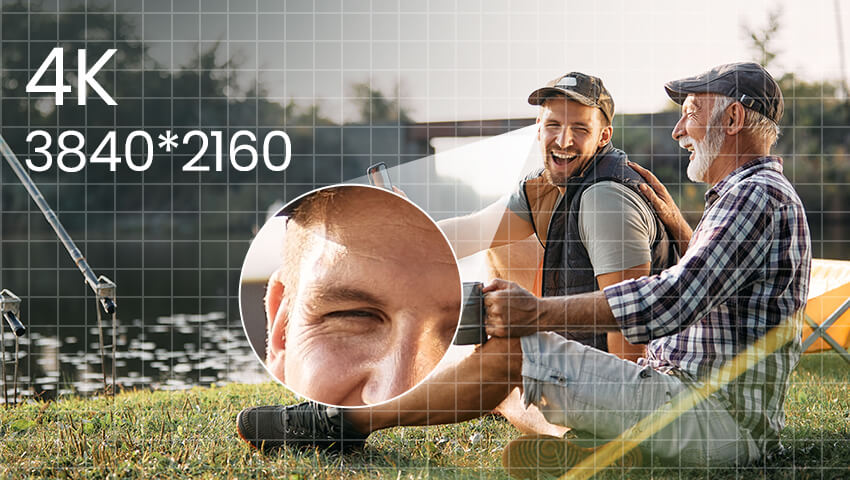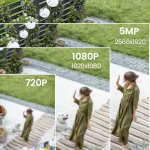In today’s world, security cameras have become an essential part of protecting our homes, businesses, and public spaces. Whether it’s keeping an eye on your front porch, monitoring a retail store, or safeguarding a parking lot, video surveillance plays a major role in modern security systems. As technology advances, the demand for clearer and more detailed images continues to grow. That’s where 4K resolution comes in.
You’ve probably heard of 4K when shopping for TVs or laptops, but this technology has now entered the security industry as well. Many people wonder: What does 4K resolution actually mean for a security camera? In this blog, we’ll break down what 4K is, the benefits it brings to video surveillance, and answer some of the most common questions people have before investing in 4K security systems.
Contents
What Does 4K Resolution Mean?
At its core, resolution simply refers to the number of pixels that make up an image. The more pixels, the sharper and more detailed the image will be.
4K resolution is defined as 3840 x 2160 pixels, which equals about 8.3 million pixels in total.
By comparison:
720p HD = around 1 million pixels
1080p Full HD = around 2 million pixels
4K Ultra HD = about 4 times the clarity of 1080p
To put this into perspective, imagine zooming in on a security video to identify a face or a license plate. On a 1080p camera, the image may quickly become blurry, making it hard to capture important details. On a 4K camera, however, the same zoomed-in footage remains sharp enough to identify key features.
In security, details matter. A small difference in clarity can determine whether evidence is useful or useless in an investigation. That’s why 4K is considered a big leap forward in surveillance technology.
Benefits of 4K Security Cameras
1. Crystal-Clear Detail
The biggest advantage of 4K cameras is the incredible image quality. With four times the resolution of 1080p, you can clearly see facial features, license plates, and even small objects that might otherwise be overlooked. This level of detail is critical when footage is used as legal evidence.
2. Wider Coverage with Fewer Cameras
Because 4K cameras capture so much detail, a single camera can often cover a wider area without losing clarity. In many cases, you might replace two or three lower-resolution cameras with just one 4K device, reducing the total number of units needed.
3. Better Digital Zoom
Zooming in on video footage is common when reviewing an incident. With lower resolutions, zooming makes the image pixelated and unclear. 4K cameras allow you to digitally zoom in much further while maintaining useful clarity, making it easier to spot crucial details after the fact.
4. Higher Security Value
For both homeowners and business owners, investing in a 4K security system means stronger protection. Clearer video provides peace of mind and ensures that, if something happens, the footage can genuinely help resolve the issue.
Example: Imagine a shoplifting incident in a retail store. A 1080p camera may capture a suspect but not the small item in their hand. A 4K camera, on the other hand, can clearly record the object and provide stronger evidence for the police.
Q&A: Frequently Asked Questions About 4K Security Cameras
Q1: Do I really need a 4K security camera at home?
It depends on your needs. For basic monitoring, a 1080p camera is usually enough. But if you want to clearly capture faces, packages at your doorstep, or license plates in your driveway, a 4K camera is worth the investment.
Q2: Will 4K cameras take up too much storage?
Yes, 4K videos are larger in file size compared to 1080p. However, modern systems use advanced compression formats like H.265 that reduce storage needs by up to 50%. You can also manage storage by setting recording schedules or using motion detection instead of continuous recording.
Q3: Does 4K require faster internet speed?
For local recording, internet speed doesn’t matter. But if you want to view live 4K footage remotely, you’ll need a higher upload speed to avoid buffering. A good alternative is to stream in 1080p while keeping the original 4K video stored on your recorder for review.
Q4: Are 4K cameras good at night?
Resolution alone doesn’t guarantee good night vision. Night performance depends on the camera’s sensor size, infrared (IR) lighting, and advanced features like AI-powered low-light enhancement. Many modern 4K cameras combine these technologies to deliver sharp images even in complete darkness.
Q5: Are 4K cameras more expensive?
Yes, they generally cost more than 1080p or 2K cameras. However, the price gap is shrinking as 4K becomes more mainstream. For many homeowners and businesses, the long-term security benefits outweigh the slightly higher initial cost.
Conclusion
4K resolution represents a major step forward in the world of security cameras. With sharper details, better zoom capabilities, and wider coverage, 4K surveillance systems provide stronger protection and greater peace of mind.
While challenges like storage space and internet bandwidth need to be considered, advances in compression technology and flexible recording options make 4K cameras more practical than ever before. For anyone serious about security—whether at home or in a business environment—investing in 4K is no longer a luxury but an increasingly affordable standard.
When choosing your next security camera, remember: resolution is important, but it’s not the only factor. Consider night vision quality, storage options, and smart AI features alongside 4K resolution to ensure you get a system that truly fits your needs.

